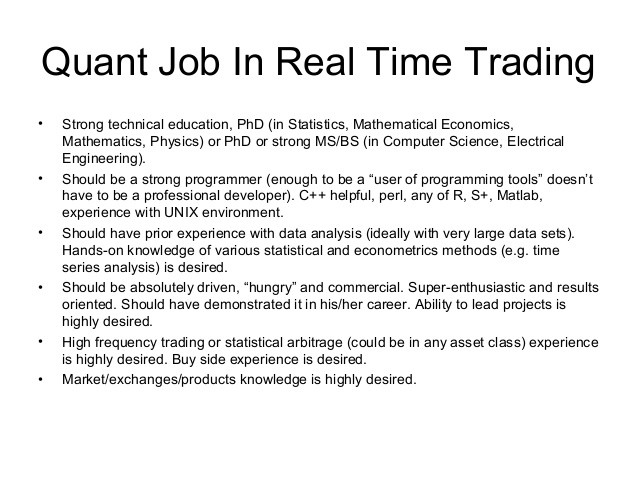Understanding How to Become a Quantitative Analyst
Post on: 5 Июль, 2015 No Comment

By Michael Halls-Moore on September 24th, 2012
A position as a quantitative analyst is financially lucrative and intellectually stimulating. The competition for roles is tough, especially within top tier funds and investment banks. Being top of the class and gaining a great degree is not enough these days, especially after the market downturn following the 2008 credit crisis. What attributes should a good prospective quant have and how can you obtain that lucrative job as a financial engineer?
A quantitative analyst can have a varying set of responsibilities. Topics such as systematic trading, financial research, managing risk, options pricing and quantitative programming are all roles that might be termed a quant. At the outset, you must evaluate your skills and determine what you are good at, be it mathematics, data science or software development. This will put you in a much better frame when applying for particular quant jobs. There has been a transition recently away from investment bank hiring towards hedge fund/quantitative trading positions. Thus, options pricing is decreasingly being sought, whereas statistics and pattern recognition are now being requested.
If you wish to work in a quantitative role, it is best to have gone down one of three paths. The most likely way into a quant job is to obtain a PhD in a mathematical discipline such as Physics, Engineering or CompSci. Clearly mathematical finance is a good area of research, but probability, stochastic calculus, statistical analysis and machine learning are all highly valued. The main benefit of a PhD course is that the firm will understand your capability towards independent research, without the need for being excessively micro-managed. These skills are most useful in the top tier funds, where a research atmosphere is often cultivated.
Another path into financial engineering is via a Masters course in Mathematical Finance. These are usually known as MFEs of MMFs. Individuals who possess natural mathematical ability, but lack financial knowledge, are particularly good candidates for these courses. If you wish to have a career transition, they also make a perfect spring board. The task of a financial masters course is to educate the student in options pricing, probability theory, financial regulation and sophisticated software development (almost certainly C++). The lecturers will provide a beneficial network, upon which to cultivate a potential career and this alone can justify the $50,000 course price tag.
If you are more computationally inclined, then a quantitative development role will likely be more fitting. Firms are always on the look out for those with advanced object-oriented experience, particularly in C++, Python or Java. As a quant dev you will work closely with the modellers to take a prototype (written in MatLab/R), optimise it and make it highly fault tolerant for a production environment. However, the roles vary significantly in what is asked for. An investment bank will want experience linking together legacy systems and large libraries, perhaps to produce interfaces for the traders in Excel. A hedge fund will likely be interesting in statistical coding — such as machine learning or pattern recognition. Be aware that development talent is often the deciding issue in quantitative interviews. Hence, the more practice and experience you can gain prior to applying, in a solid object-oriented language, the better.
Michael Halls-Moore
Mike is the founder of QuantStart and has been involved in the quantitative finance industry for the last five years, primarily as a quant developer and later as a quant trader consulting for hedge funds.














